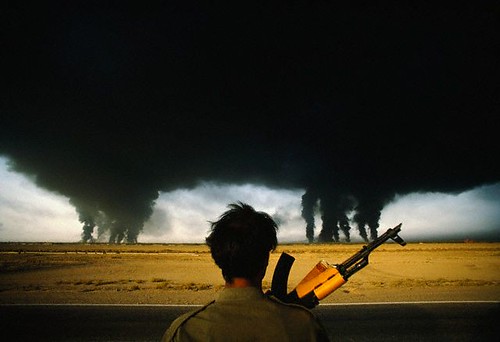Monday, May 28, 2007
Drought prompts concern
What Can I Do
 I'm not an expert on Climate Change. But as I read Tim's book, I am deeply moved and troubled. What can one person do? The picture he paints does not look good from what I've read so far. I'm starting chapter four. I think the underlying message in this book so far is that the future is uncertain. Whether man survives or not will depend of whether we are able to make changes quickly to cut CO2 emissions and other greenhouse gases that we are pouring into the atmosphere. The future will depend on how fast we are able to do this. And this in turn will be the deciding factor as to whether or not our species survives. Some will die because of climate change. That is almost certain. How many will die is the unknown... I can't read this book and believe otherwise.
I'm not an expert on Climate Change. But as I read Tim's book, I am deeply moved and troubled. What can one person do? The picture he paints does not look good from what I've read so far. I'm starting chapter four. I think the underlying message in this book so far is that the future is uncertain. Whether man survives or not will depend of whether we are able to make changes quickly to cut CO2 emissions and other greenhouse gases that we are pouring into the atmosphere. The future will depend on how fast we are able to do this. And this in turn will be the deciding factor as to whether or not our species survives. Some will die because of climate change. That is almost certain. How many will die is the unknown... I can't read this book and believe otherwise.Tree Hugger's Green Guide

How To Green Your Accessories
How to Green Your Baby
How To Green Your Wedding
How To Green Your Electronics
How to Green Your Pet
How to Green Your Sex Life
How to Green Your Coffee & Tea
How To Green Your Dishwasher
How to Green Your Recycling
How to Green Your Cleaning
How to Green Women's Personal Care
How to Green Your Furniture
How to Green Your Work
How to Green Your Water
TreeHugger's Green Gift Guide 2006
How to Green Your Gifts
How to Green Your Lighting
How to Green Your Electricity
How To Green Your Car
How To Green Your Wardrobe
How to Green Your Heating
How to Green Your Meals
How to Green Your Public Transportation
Saturday, May 26, 2007
Neo Green Sustainable considerations
How a company designs, sources, produces, and distributes. Upstream and down stream factors. What sustainability training do they offer? Do they have a sustainability pledge? If so, what is it? What is the minimum age of their overseas’ worker? Does their building have LEED’s certification? What causes does it give its one percent to? Environmental issues, human rights issues, public health and safety? How does it help the community in which it operates? How does it treat its employees? Check the articles of incorporation to see what it says its commitment to these issues.
Neo-Greens vs. the Age of Brutalism

William McDonough said in his TED talk that when NOAA was testing water above Hawaii in the North-Pacific-Central-Gyre and they discovered that it had six times more plastic particles than phytoplankton in it! I'm sure some will say that this doesn't matter. My answer to this is "R-E-A-L-L-Y? How could it not matter?" Phytoplankton is the source of half of all of the oxygen on this planet. How could that not matter? It is a live organism that depends on certain nutrients being found in the water. It can't eat plastic and there is six times more plastic particles than phytoplankton? Who could say that is not a problem?
McDonough says that we are "making our ocean into a giant toilet that doesn't flush" with all the junk we are dumping into it! Anyone that wants to bet against the neo-greens is only looking at the short-term. There is no place for them to go but up.
William McDonough's TED talk!
One Percent for the Planet...
Wednesday, May 23, 2007
The New Dragon...
I've spent a life time trying to lift the down trodden with the gift of education as a way out only to have those efforts fall on blind minds and deaf ears. People whose minds were too distracted to realize that an education may be their only hope for a better future. But they valued Nike shoes, gold chains and hip clothes over knowledge. The scoffed at reading and writing and chose hip hop gangster rap instead to be their guide. And now a monster threatens our shores, people who are dying to live on 35 cents a day are changing the economic landscape that we depend on for our way of life. We have no will to fight this dragon. We have lost our way...
If we could take a portion of the 27 million who live in poverty, and put them in American schools, would they too choose hip hop gangster rap over wisdom and sage advice? Would they learn to shun the things that could free them? Would they value and take advantage of their education or would they chose to follow the path of indifference like so many American children? Are we just too limited as humans to make the right choices? Maybe we just haven't evolved enough as a species and it will take millenniums before we can change our self destructive tendencies that seem to be hardwired into our genetic coding. Unfortunately this isn't new to human kind, it's just on a grander scale. It turns out that Darwin was probably right:
"It is not the strongest of the species that survives nor the most intelligent, but those most adaptive to change." Charles Darwin
Book:
Disposable People: New Slavery in the Global Economy by Kevin Blades
The horror of slavery, says Kevin Bales, is "not confined to history." It is not only possible that slave labor is responsible for the shoes on your feet or your daily consumption of sugar, he writes, the products of forced labor filter even more quietly into a broad portion of daily Western life. "They made the bricks for the factory that made the TV you watch. In Brazil slaves made the charcoal that tempered the steel that made the springs in your car and the blade on your lawnmower.... Slaves keep your costs low and returns on your investments high." The exhaustive research in Disposable People shows that at least 27 million people are currently enslaved around the world. Bales, considered the world's leading expert on contemporary slavery, reveals the historical and economic conditions behind this resurgence. From Thailand, Mauritania, Brazil, Pakistan, and India, Bales has gathered stories of people in unthinkable conditions, kept in bondage to support their owners' lives. Bales insists that even a small effort from a large number of people could end slavery, and devotes a large chapter to explaining the practical means by which this might be accomplished. "Are we willing to live in a world with slaves?" he asks. As a sign of his commitment, all his royalties from Disposable People will go toward the fight against slavery.
No, University of Surrey lecturer Bales isn't reporting on wage slavery: the stories that slip into the newspaper now and then about workers in sneaker or soccer ball factories in Indonesia or Vietnam earning 20 cents or $1 a week. Bales means 27 million people held in chattel slavery, debt bondage, or contract slavery: "enslaved by violence and held against their wills for purposes of exploitation." Their masters he calls "slaveholders" because they don't claim to own their victims; they control their victims' lives and mobility and gain enormous profits from their labor. Bales investigated five case studies--prostitution in Thailand, water delivery in Mauritania, charcoal making in Brazil, brickmaking in Pakistan, and bonded labor in Indian agriculture--to trace the nature of modern slavery and compare its forms. Three factors explain the new slavery: the population explosion; economic globalization and modernized agriculture; and "the chaos of greed, violence, and corruption created by this economic change in many developing countries." Globalization ties us all to the new slavery, and Bales suggests what the reader can do...
( Hope we evolve faster... )
Tuesday, May 22, 2007
Ecopreneur
Sunday, May 20, 2007
Friday, May 18, 2007
Antarctica’s ability to absorb carbon is critical and declining

May 17, 2007 — Antarctica’s Southern Ocean, a crucial "carbon sink" into which 15 percent of the world's excess carbon dioxide flows, is reaching saturation and soon may be unable to absorb more — a deeply troubling development, the journal Science reported Thursday.
Do you recon that if Al Gore actually ran for president, he could get people's attention?
Thursday, May 17, 2007
Eco Solutions-Forbes
Australia's drought a warning for others?
I found this on MSN Video about the drought in Australia. Water is the new gold.
Anartica is melting

Saw this picture on MSNBC's website tonight. Also found an interesting list of scientists who have turned into Global Warming Skeptics. The jest of their argument is: 1. it’s less about science and more about making money. 2. CO2 is probably secondary to the root cause.
It would seem to me that the concentration of capital around green issues like Global Warming is a good thing. Like it or not, things will not change unless business begins to buy into it and profit from it. We know that businesses can not exist unless they make a profit. So turning Green issues like Global Warming into a capitalist venture, I'm not so sure that is a bad thing, if in the long run we begin to develop more sustainable practices.
One could ask the question: "If man has developed the technology to cut down every tree on the face of the earth, is it the right thing to do?" Man has the technology to do so, but is it a good practice? It is doubtless that anyone wants to cut down every tree or catch every fish in the ocean for that matter, but it is the cumulative effect of our actions that creates the problem. If we can develop a less harmful way to provide goods and services for consumers, how can that be a bad thing? Isn’t it our responsibility as citizens’ to care about future generation’s ability to continue to thrive on earth? Regardless of the cause, it would seem prudent to me for civilizations to examine the issue of sustainable business practices.
I'm not so sure I agree with the writers premise that climate change is just a scam.
Saturday, May 12, 2007
In Search of Answers Part II
Frank Luntz, the man Democrats love to hate, was on Bill Maher's show last night. Luntz said Democrats lose because they only attack and never tell what they stand for. I'm sorry to say but I agree with him. This report: Improving the Allocation Process for Federal Science and Technology written in 1995 recommended that we should stay away from funding the research of energy physics as a nation and try to "share the cost" with other nations instead .
What we did as a nation was embark on a path of non-research for our energy consumption needs. Only a babe who was totally naive about geopolitics would believe that our county’s strategic interest in Iraq was not about oil. There have been too many academics and national leaders who have debated this argument already so I will leave it stated as a fact. As a nation, if we look at the cost of the Iraq war, which was a policy decision about our energy, wouldn't we have come out ahead if we had not followed the recommendation by the National Academy of Science?
To me, this is a Katrina thing. NOW on PBS showed how the oil companies have been funding public education and Science organizations which are supposed to be independent and not influenced by special interests. I go back to Jackson Browne's song, "I want to know who the men (and women) in the shadows are…” I want to see their faces. I want to see who was influencing their decisions. How did they come to their conclusions? And what are they saying now?
If the Iraq War is the result of special interest groups' influence over lawmakers, I’d like to know? Who are they, how did the come to their conclusions and recommendations? Who or what influenced them, and now that we have paid billions if not billions, trillions of dollars in Iraq, have the changed their mind?
We have lost so much more than money because of our leader’s short-sightedness. We’ve lost credibility and good will in political capital around the world. I'll go back to what Luntz said, what do the Democrats believe in anyway? I search and search and search for a rationale plan for the future by the marketplace and all I see is more of the same. Conspicuous consumption, billions of dollars spent each year on things that end up in land fills and no concern about the sustainability of our consumption habits, no effort to modify our designs or move in a new direction; only lip service. It's just not there. Do the Democrats not think that this might be a good place to start regarding stating out beliefs?
The definitive guide to every single GOP scandal
read more | digg story


























